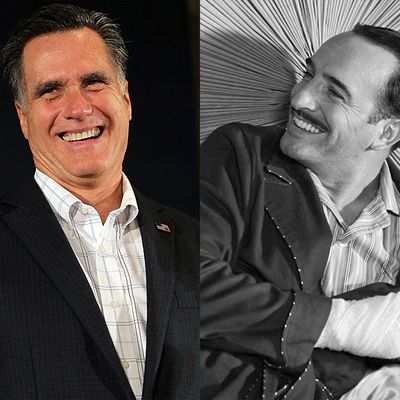
You rarely find much overlap between Hollywood and Republican voters, but this year is different: When Republicans complain about front-runner Mitt Romney and search desperately for a contender who can supplant him, it uncannily resembles the conversations of awards voters or Oscar pundits less than impressed by this yearÔÇÖs crop of Best Picture candidates. Like Romney, The Artist is considered to be the one to beat, and both certainly fit the bill on the surface, each projecting a retro idea of what presidents and classic movies are supposed to look like. And yet, the field in both cases has been unusually volatile, with a great majority of voters refusing to line up behind the front-runner but unable to come to a consensus on which of the yearÔÇÖs weak competitors could win instead.
But the comparisons go well beyond the unsettled (yet seemingly preordained) nature of the race: In a weird twist, the themes and plot twists of the Best Picture candidates actually seem to mirror the Republican candidates. The Descendants serves up a wife in the hospital and explores the consequences of infidelity, two things Newt Gingrich knows a little too much about. MoneyballÔÇÖs Billy Beane has the temerity to shuck tradition and make merciless, numbers-driven cuts to his organization; when the old-timers react with horror to the calm Beane and predict failure, it recalls the elite Republican response to the similarly revisionist Ron Paul. And no candidate this season drew a more explicit comparison to Oscar bait than Michele Bachmann, who appropriated Meryl StreepÔÇÖs new Margaret Thatcher biopic with an ad earlier this month that cast her as ÔÇ£AmericaÔÇÖs Iron Lady.ÔÇØ
Critics mostly wrote off The Ides of March for its simple story of how an affair mars the campaign of a presidential hopeful: HadnÔÇÖt we already seen this before? they complained. We had, with John Edwards, but we saw it yet again this season with Herman Cain. Meanwhile, values voters have aligned behind the square-but-slipping Rick Santorum and War Horse (though after SantorumÔÇÖs alarmed comparisons of gay marriage to bestiality, the passionate boy-on-horse love of War Horse takes on delicious new dimensions).
Even the media-driven narratives seem the same: We were told that late-season party crashers like Rick Perry and Extremely Loud and Incredibly Close would immediately transform a weak field  and then, not so much, as both candidates have faded from the pack after scathing reviews and a lack of important wins. Meanwhile, the press has almost single-handedly kept both Jon Huntsman and The Tree of Life alive and in the race, and while theyre critical darlings who supposedly appeal to our better angels, neither fits the bill of what voters are looking for right now. And its time to stop wishing and praying for Chris Christie and Drive, guys. Though itd be exciting to see their names on that ballot, its not gonna happen.
The shadowy world of Oscar campaigns and consultants has always mirrored the vagaries of a political primary, but this year, theyÔÇÖve got the movies to match. In fact, Hollywood may have outdone Washington this time: The opposition research is even juicier (the Republican primary had accusations of sexual harassment, but the Oscar race has Kim Novak melodramatically crying rape), and best of all, itÔÇÖll all be over in late February, while the eventual Republican front-runner has to keep slugging it out until November. And you thought Oscar season was a long haul!

